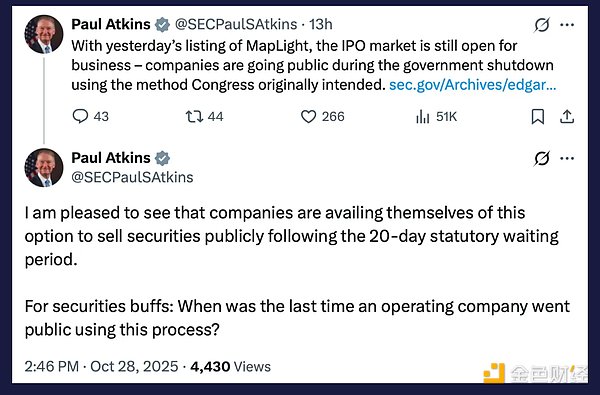Author: Eleanor Terrett Translator: Shan Ouba, Jinse Finance
This week is poised to be the most pivotal week for cryptocurrency ETFs since the launch of the Ethereum ETF in July 2024—a week almost no one anticipated.
On October 29th, three new cryptocurrency ETFs made a high-profile debut on Wall Street: Bitwise's $BSOL Solana ETF saw $56 million in trading volume on the New York Stock Exchange's Arca platform, becoming the largest ETF launch this year; Canary Capital's Hedera ETF and Litecoin ETF debuted on Nasdaq, with trading volumes of $8 million and $1 million respectively.
Later this morning, Grayscale will list its Grayscale Solana Trust ($GSOL) on the New York Stock Exchange's Arca platform, commencing trading as an ETF.
Why did these ETFs suddenly launch during the government shutdown? It turns out that legal proceedings don't always require government agencies to function normally. Earlier this month, ETF issuers added a special "immediate effect" clause to their revised S-1 registration documents: the document will automatically become effective 20 days after submission, provided the exchange agrees. This default legal mechanism, established under the Securities Act of 1933, does not require SEC approval. Previously, SEC staff would review the S-1 document first, then manually declare it effective before the ETF could begin trading. Bitwise updated its S-1 document first, gaining a clear first-mover advantage. Historically, the SEC has ensured that all cryptocurrency ETFs, including the 10 Bitcoin ETFs launched in January 2024, began trading on the same day.

SEC Chairman Paul Atkins posted on the X platform that he was pleased to see companies using the 20-day statutory waiting period to bring products to market during the government shutdown, and praised the legal mechanism used by Bitwise and Canary Capital to launch their ETFs.
The significance of this event is that a new paradigm is emerging in ETF issuance, with the SEC's role becoming less prominent than before. It is expected that other issuers will use this mechanism to bring products to market more quickly, especially while the government shutdown continues.
 Brian
Brian



